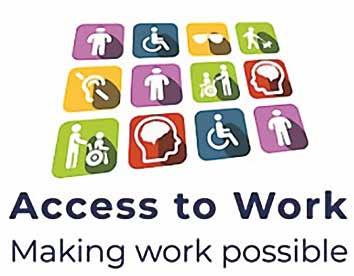
13 minute read
Don’t let the talent slip through
from Opening Doors 2022
by Quids in!
The Ones Who Get Away:
Fishing From A Shrinking Talent Pool
Advertisement
In this period of high employment, and fewer migrant workers, vacancies in Bath and the surrounding area are going unfilled. Is it time to cast the net wider? Or narrow the holes to stop talent slipping away?
“W e had someone who was very good at administration duties, paid excellent attention to detail and always wanted to work in a hospital.
“The NHS locally was employing people to do blood tests, paying quite senior staff to do a role when they could have been working in intensive care situations instead. We talked to them about how to start looking differently at the way they did things. We said we could free up the time for that person to do other aspects of the job. We could also add value by creating a new job that would be specific to our jobseeker’s needs. “The team were blown away by the fact they would be able to do it like that.” Alicia Moyles is Head of Service for
Specialist Employment at The Education People, part of Kent County Council. Her role is to help employers think more creatively to fill staffing gaps by lining up talent from communities that are often overlooked. The organisation engages people with additional needs, ranging from kids in special schools needing help to raise their aspirations to disabled people who have been left alone by services for twenty years or more. Alicia believes most employers are missing a trick.
“Now we have someone in a full-time role that does an admin job and also does the blood testing in that department to make sure those records are correct. It freed up a lot more front-of-house work so the doctors can work more closely with more patients. It became a much more streamlined service.” The Recruitment Challenge
Employers in Bath and North East Somerset (B&NES) are at the business end of political uncertainty, as the toing and froing of Brexit impacts the numbers visiting the area and coming here to work. Britain is also experiencing the highest employment levels since the 1970s, already making life harder for recruiters. Meanwhile, support agencies claim the talents of some unemployed people are being overlooked. Is it time to think differently about building a workforce?
A number of projects in B&NES work with employers to consider the talent that often slips through the net. They ask: Your recruitment systems are designed to be fair but are they excluding people capable of the job, just not the application process? Or are the jobs themselves the
wrong shape where one with narrower scope could be filled immediately?
According to the Chartered Institute of Personnel Development, high employment and “at least in part… the continued fall in EU net migration” have contributed to a twenty per cent drop in applications for low skilled roles from an average twenty in 2018 to sixteen in 2019. ‘Recruiters are looking for solutions. Increasing numbers are reviewing policies and processes that may be inadvertently screening out perfectly capable applicants.
In March 2019, CMD Recruitment reported the average cost of filling a vacancy is £3,000 and that staff turnover costs a third of each leaver’s salary. What’s more, increasing rates of pay may not be the silver bullet solution. CMD says ten per cent higher pay only increases retention to an employee’s next promotion by 1.5 per cent. On the other hand, it claims: “Highly inclusive organisations generate 1.4 times more revenue.”
Practical Help in Bath
One in 50 people in the UK have a special educational need or disability (SEND), according to learning disability charity Mencap. SEND includes often invisible conditions like ADHD, autism (including Asperger’s Syndrome), sensory processing disorders and dyslexia, and also Tourette’s and Down’s Syndrome. Most people can live and work independently if the right facilities are in place to compensate for them taking longer to learn or needing a more structured approach to understand information. These additional needs vary from person to person but employers and jobseekers can increasingly find support to get the fit right.
Shockingly just six per cent of people with SEND are in employment. Much of the other 94 per cent represent a huge and latent workforce just waiting to be tapped.
It is no more possible to generalise about what SEND jobseekers have to offer than the rest of the labour market just wanting to earn a living. Some like repetitive roles they can perfect and excel at. Some like working with the public. Some like nothing better than deep-dive data analysis. In the right role, and sometimes with the right support on hand, they can fill a gap no-one else might want. For some, the number of hours and rate of pay are not the motivating factors.
Increasingly, support agencies are aligning their offer to what employers need. For Alicia at The Education People, supporting employers to capitalise on the potential of this workforce sounds almost like a calling. “We try to understand the individual inside and out. Understanding their aspirations, we can then work with an employer and say, ‘Hey, we’ve got someone who’s great here. They’re gonna be a great asset to your business, help you to increase turnover’.” One option is ‘job carving’. Like the example above with the NHS, the process is simply a review of a job description to see if a specific part of it could be somebody’s only role. Employers with long-standing vacancies might redesign job descriptions to attract different people. Recruiters need to recognise barriers like expecting all staff to be good all-rounders and reflect on their recruitment processes too. “Sometimes employers use internetbased recruitment and it’s sometimes difficult for SEND people to apply. Work tasters can be a far more effective form of recruitment or meeting someone and having a casual conversation. I think employers put up barriers by trying to make things all inclusive but they’re actually doing the opposite. They’re not meaning to.” A report by Reed in Partnership found that although 93 per cent of small and medium sized enterprises confirmed they had an equal opportunities policy in place, one in three did not knowingly employ disabled staff.
National programmes like Disability Confident are looking to employers from all sectors to ensure recruitment processes are fully inclusive too. Over 13,000 organisations have signed up, pledging to level the playing field.
Kate Nicholls, Chief Exec at UKHospitality, is a champion for Disability Confident and spells out the advantages to many employers in the wider Bath area: “At a time when the hospitality sector could be facing a skills and labour shortage, we need to make sure we can offer great opportunities for all talented people.”
“I think there’s a fear of employing
people with some form of disability,” acknowledges Alicia Moyles. “They’re worried if something went wrong, would they still be able to manage it in an HR way. I think they just need a hand in how to do it confidently. We’ve helped people through company restructures and redundancy, so there’s no problem.” Like the Education People in Kent, in Bath & North East Somerset initiatives are focusing on employers’ needs to line up talent from the SEND jobseeker pool. Disability charity Leonard Cheshire works closely with employers in the area. It offers taster sessions and placements, and is developing a supported internship programme in 1.4 partnership with Three Ways and Fosse Way schools. Samuel Sherlock, from its Highly inclusive Change Now programme, organisations generate 1.4 times more revenue. explains: “We match young people with employers and provide some free Disability Equality Training to employers wishing to take part. The training we offer employers is generally two or three hours long and provides a sort of beginners guide to thinking about things differently. “Ideally we’re passing on some increased knowledge and confidence in supporting Disabled People,” he continues. “We’re breaking down some misconceptions and just focusing on the individual needs of all people, as opposed to being afraid of the D word!” Project Search is another initiative available locally but is part 6% of an international movement forging partnerships between employers and colleges to match SEND jobseekers to of people with SEND are in employment supported internships. Training is led by Bath College and support is provided by HCRG (formerly VirginCare), working with employers to enable SEND jobseekers to access the labour market. B&NES council is itself an employer hosting work placements for individuals working towards the opportunity of paid employment at the end of the year-long programme. For employers, perhaps now is the ideal time to get creative about filling gaps in their workforces. There is undoubtedly a pool of talent that remains a largely untapped resource in the local area. If the support and need and opportunity is there, it only takes the will to make it happen. ■ Opening Doors is the initiative to help employers fill vacancies by considering well-matched jobseekers with additional needs in Bath and the surrounding area. For more information, turn to page 16. This article was first published in 2020.
Confidence Booster
Disability Confident is the government’s kitemark for employers who step up to show they mean business about equal opportunities for disabled people

Employers have not exactly made themselves a beacon of hope for disabled people in Bath and North East Somerset. By Spring 2022, 49 had signed up to the government’s Disability Confident scheme, a three-tier kitemark scheme for organisations wanting to demonstrate their commitment to equal opportunities. That is set to change.
A number of initiatives across the West of England are in the pipeline to promote good practice among employers and their recruitment teams.
Opening Doors, (this magazine), also reflects a collective effort from stakeholders supporting recruiters to enable SEND jobseekers to access the labour market. All these initiatives see Disability Confident as a good first step for marking a line in the sand and agreeing to see what more they can do.
The bold advertising image (above) emblazoned across the Disability Confident homepage (disabilityconfident. campaign.gov.uk) accompanies testimonials from Sodexo, Lloyds Banking Group, Zurich and Marriott. Kate Nicholls, Chief Executive at UKHospitality, also explains why she’s in: “At a time when the hospitality sector could be facing a skills and labour shortage, we need to make sure we can offer great opportunities for all talented people. Being Disability Confident is just good business sense.”
Disability Confident deserves a higher profile among employers, as do the jobseekers it champions. One local authority to nail its colours to the mast is Suffolk County Council. Its “#IAmConfident” advertising campaign promotes the programme but also the need to combat discrimination for disabled people, and their values as a recruiter.
To sign up to the Disability Confident scheme go to: https://
disabilityconfident.dwp.gov.uk/

Access to Work
Financial assistance from the government to mitigate restrictions on the job caused by a disability or condition may be available through Access to Work. This could cover transport for getting to and from the workplace safely, adaptations or equipment to help staff complete tasks, or additional support.
It is available to individuals, not employers, and can be claimed from the recruitment stage. New appointees should apply as early as possible, but it can also be accessed by existing staff with a new diagnosis. Some find the process and criteria complex, so supportive employers can offer support or signpost advice from Citizens Advice or a charity that specialises in the individual’s needs.
Ffi: www.gov.uk/access-to-work
Leading By Example:
National Grid

For people in Britain with learning disabilities, finding paid work is challenging. Nationally, only six per cent of people with learning disabilities are in paid employment. Yet, according to research by charity Mencap, some 65 per cent want to work. National Grid wanted to do something about that.
Through supported internships, our ‘EmployAbility: Let’s work together’ programme aims to improve the job prospects of young people with learning disabilities. We want to raise their aspirations and help them to develop personal and work-based skills. We’ve demonstrated a ten-fold increase on the national average employment rate, with 60% of our interns achieving paid employment when they graduate. Many more interns have gone on to further education or training.
Our programme started back in 2013 as a partnership with Round Oak Special Educational Needs School (now Evergreen School) in Warwick. In that first year, we offered internships to five students at our nearby offices. We saw an enormous transformation in each of the shy and nervous students that first arrived, as they grew in confidence and self-belief, often for the first time in their lives. Since then, we have reached our one hundredth intern which is a significant milestone. We’ve expanded across five of our offices and are in partnership with eleven schools and colleges.
The supported internship model is simple. National Grid identifies a range of roles that an intern can fill. These could be office-based, or in departments such as catering, reception or facilities. An intern spends around three months in one of these roles, supported by a job coach provided by one of our partner schools and funded by a government-funded Access to Work grant. They provide individually tailored support to each intern, breaking down the role into manageable parts, training the intern and helping them to settle in. While at National Grid, the intern normally completes two or three placements in different areas of the business over the course of an academic year, giving them a thorough introduction to the organisation and different workplace tasks.
As well as their placements, the interns also spend a few hours every morning, with their job coaches, studying for a BTEC in work and functional skills. The qualification covers topics such as writing CVs and preparing for interviews. Armed with these new skills and workplace experience, it helps to make sure that at the end of the year, the interns are employment ready.
Mark Pickles, National Grid co-founder of EmployAbility and business programme director of EU Regulatory Affairs, said: “As well as transforming the lives of the young people who take part, we’ve found that there are also enormous benefits for our business and employees. It’s opened up a whole new pool of talent for us, in an area where it is sometimes difficult to recruit. The interns bring a fresh and honest approach to work, and an enthusiasm that boosts the morale of all the employees around them. Our employees are more confident about working with people with disabilities, more inspired by National Grid’s social commitments and more aware of issues in their community. It’s also a chance for those involved to develop their leadership and coaching skills. It really is a win-win.”
We know that to help transform the lives of as many young people with learning disabilities as possible, we need to share what we’re doing with other organisations. And one of the best ways to do that is by seeing the programme in action. Organisations from across the country have come to see our interns in the workplace and our interns regularly speak at schools and events. We’re proud that so far, a number of other businesses have set up their own programmes inspired by what they’ve seen at National Grid. These include Severn Trent in Coventry, Sheffield Teaching Hospitals NHS Foundation, Amey in Sheffield and Yorkshire Water in Leeds.
As well as inspiring others, we want to make it easy for other organisations to adopt our model. Check out www.
nationalgrid.com/responsibility/
community/employability. Supported by funding from the Careers and Enterprise Company, we’ve developed a toolkit of resources for organisations ready to set up their own programme.
6% of people with learning disabilities are in paid employment ■ Find out more about the programme:


